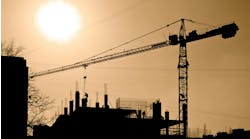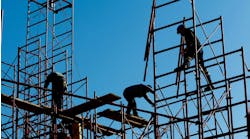AS THE WAR in Iraq progresses, we should not get ahead of ourselves in talking about when the fighting will end. I know too many people who predicted the war would be quick and almost bloodless.
It’s not too early, however, to consider the enormous amount of reconstruction that will have to take place in Iraq whenever the fighting stops. The damage done to Iraq’s roads and bridges, schools, government buildings, sanitary and water supply systems and oil fields has been massive, as we all can see daily on TV.
The rebuilding effort will be made even more complicated by the fact that the damage is not just the result of the aerial bombing campaign that began in March. Some of the infrastructure damage done during the first Gulf War only has grown worse in the intervening 12 years when the priorities of Saddam Hussein’s regime were clearly elsewhere.
The U.S. government has dubbed the current war “Operation Iraqi Freedom.” We should remember that with political liberation should come freedom from the fear of disease and death caused by the filth of broken water supply and sanitary systems.
American technology and good, old Yankee know-how will be needed in mass quantities during the reconstruction of Iraq. U.S. mechanical engineers and contractors must play an important role in the rebuilding effort, working alongside their colleagues from other trades and other countries.
Much discussion in the media has focused on the notion that other Arab nations and the rest of the world will judge the U.S. by how we will handle Iraq’s oil industry when the fighting ends. The consensus seems to be that we’ll be evaluated more favorably if we allow Iraqi nationals to administer their own oil business after the war rather than trying to run it ourselves.
I’d argue that we also will be judged by how quickly we help the Iraqi people get back on their feet. U.S. and British officials recently predicted that the reconstruction needed in Iraq will take years to accomplish. While that’s undoubtedly true, the extent and speed that Americans and our partners can repair the Iraqi infrastructure may surprise a few people. The truly awe-inspiring part of the shock and awe campaign may be yet to come.
Most Americans are more intent on building things than they are at knocking them down. The reconstruction effort in Iraq will show that fact to the people around the world who don’t realize it already.
I happened to be traveling in central Europe during the “shock” part of the campaign. With Baghdad just two time zones to the east, I was among a small group of U.S., British and Czech citizens who watched the bombing begin from our hotel TV lounge. And, the enormity of the assault shocked us all.
In visiting four European countries in two weeks, however, I did not encounter any overt anti-American feelings from the people I met in shops, hotels, restaurants or business meetings. The only anti-war protest that I saw was in Prague, Czech Republic, where many of the protesters appeared to by American and British citizens who had relocated there.
That’s not to say that most of the Europeans I met support the war. But their disagreement with U.S. foreign policy did not necessarily translate into animosity toward Americans.
One reason I was in Europe was to attend the mammoth ISH trade fair of plumbing and heating products in Frankfurt, Germany. While CONTRACTOR will carry much more coverage of the show in next month’s issue, here are a couple quick observations:
First, several European and U.S. exhibitors believed attendance to be down from the last ISH show two years ago. They attributed the supposed drop (no official figures at this time) to North Americans who decided to stay home. The Americans apparently were unsure of the reception that they would receive overseas, or they didn’t want to fly to a foreign country during a war.
Second, I couldn’t help but be struck by the contrast of what I saw during the day on the show floor at ISH and what I saw at night on my hotel TV from Iraq. The disparity of the low-emission boilers and luxurious plumbing products at ISH and the utter devastation in Iraq was stunning.
Many of the products at ISH, of course, are beyond the scope of what Iraqis need. The reconstruction effort in Iraq, however, will give Americans the opportunity to help many Iraqis achieve a standard of living that they have not been allowed to reach.

